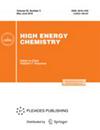胶体量子点: 2. 胶体量子点的合成方法
IF 0.6
4区 化学
Q4 CHEMISTRY, PHYSICAL
引用次数: 0
摘要
摘要 详细介绍了目前已知的各种量子点生产方法,包括最有前途的高温胶体合成(HTCS)方法。利用 HTCS 技术,可以很好地完成获得相对完美的胶体量子点(CQDs)结构的任务,并实现破纪录的窄尺寸 CQDs 分布。在合成纳米粒子的过程中,会对其结构进行高温退火。这就是为什么这种方法变得如此普遍,并导致出版活动迅速增加的原因。本文章由计算机程序翻译,如有差异,请以英文原文为准。

Colloidal Quantum Dots: 2. Methods for the Synthesis of Colloidal Quantum Dots
Abstract
Various currently known methods for producing quantum dots are described in detail, including the most promising method of high-temperature colloidal synthesis (HTCS). Using the HTCS technique, it is possible to cope quite well with the task of obtaining a relatively perfect structure of colloidal quantum dots (CQDs) and achieve record-breaking narrow size distributions of CQDs. During the synthesis of nanoparticles, high-temperature annealing of their structure occurs. That is why this method has become so widespread and caused such a rapid increase in publication activity.
求助全文
通过发布文献求助,成功后即可免费获取论文全文。
去求助
来源期刊

High Energy Chemistry
化学-物理化学
CiteScore
1.50
自引率
28.60%
发文量
62
审稿时长
6-12 weeks
期刊介绍:
High Energy Chemistry publishes original articles, reviews, and short communications on molecular and supramolecular photochemistry, photobiology, radiation chemistry, plasma chemistry, chemistry of nanosized systems, chemistry of new atoms, processes and materials for optical information systems and other areas of high energy chemistry. It publishes theoretical and experimental studies in all areas of high energy chemistry, such as the interaction of high-energy particles with matter, the nature and reactivity of short-lived species induced by the action of particle and electromagnetic radiation or hot atoms on substances in their gaseous and condensed states, and chemical processes initiated in organic and inorganic systems by high-energy radiation.
 求助内容:
求助内容: 应助结果提醒方式:
应助结果提醒方式:


